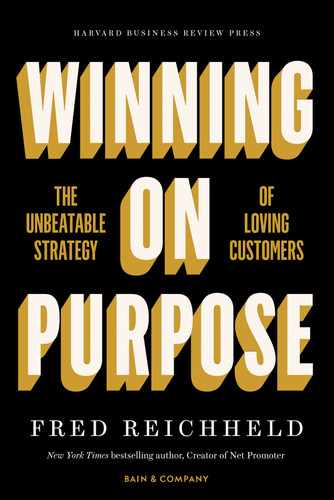Foreword
John Donahoe
CEO, Nike, Inc.
I have known Fred Reichheld for almost forty years. We met at Bain’s Boston office, where I held my first job out of college. My desk was located near Fred’s office, and he would regularly engage us junior staffers in friendly conversations, which often ended up with him extolling the transformative power of loyalty. Today he is still at Bain, still preaching about loyalty—but from a far deeper well of experience and insight. Indeed, over the decades he essentially invented the field of loyalty economics and created the now ubiquitous Net Promoter System. I always referred to him as the Godfather—of loyalty. Since the relevance of his work has grown even more important in the digital age, I suppose we should call him the DG—Digital Godfather of loyalty.
The tools and frameworks Fred developed have helped me achieve practical results throughout my career, beginning with my time at Bain. During my term as Bain’s CEO, we became the world’s first company to implement Fred’s brainchild, the Net Promoter Score, and enthusiastically supported its development into a full management system. In my subsequent CEO jobs at eBay, ServiceNow, and Nike, Fred’s concepts and inventions continued to help my teams win. And while his engaging stories and arguments have sometimes sounded more moral than managerial, they have always helped my teams deliver results. Let me go a step further and say that in a time when so many in our society view capitalism with such suspicion, we surely need to carefully consider our moral duties as business leaders. Fred’s approach can help make that practical. At the same time, just because some of Fred’s chapters have high-minded titles such as “Honor the Golden Rule,” don’t be fooled into thinking this book won’t help boost your growth rate. Indeed, Fred’s road map to customer capitalism delivers the basic tools, measures, and processes that every business leader (and every team member, board member, and investor) will need to win in this increasingly customer-centered world.
There’s more. This book provides fresh revelations for business history buffs, as Fred recounts the story (never before revealed in such detail) behind Bain’s near meltdown in the early 1990s. He was one of the dozen or so frontline partners who signed an oath to lock arms and rally behind Mitt Romney to salvage the firm from financial collapse. Through his forty-four years at the firm, Fred experienced firsthand the brilliant innovations that Bain’s founders contributed during their seventeen years at the firm as well as the nearly fatal flaws that took years of innovative resolve to mend after their departure. Why tell these stories now? I believe they help us understand how Bain became a truly great place to work—the best in the world during the past decade, according to Glassdoor—in part by teasing out and embracing the fundamentals underpinning NPS. Bain is indeed a very special place and well worth studying, because its evolving story can help every leader elevate and inspire his or her team toward greatness.
And I mean true greatness. As Fred explains in his manifesto at the end of the book:
Great companies help people lead great lives—they are a force for good. Great leaders build and sustain such communities. They inspire team members to forge lives of meaning and purpose through service to others—service not merely satisfactory, but so thoughtful, creative, and caring that it delights customers and enriches their lives.
The book is both timely and timeless. Fred begins by updating the stories of a few great companies—such as Apple, Enterprise Rent-A-Car, and Chick-fil-A, which are companies he has been writing about for decades—because they have sustained their great performance over time. These updates provide clear evidence that businesses built on virtue are resilient. They can cope with the flocks of black swans that so often descend on business leaders. In the past year alone, we’ve had to confront pandemic lockdowns, worldwide recession, racial reckonings, and an armed assault on the US Capitol. You will also read fresh new stories of digital revolutionaries that are using Net Promoter philosophy and tools to shape winning strategies, companies such as Airbnb, Warby Parker, Peloton, and Chewy. By the time you finish the book, you will surely have a new understanding of what it takes to build a great business.
To be clear, this book is no mere recap of Fred’s greatest hits. I consider Winning on Purpose to be his most important work to date. It reveals fresh breakthrough insights and clarifies the moral responsibilities of leadership as the world transitions from financial capitalism to customer capitalism. The book also provides deep and convincing evidence that the primary purpose that guides all great organizations is to enrich the lives of customers—hence, “winning on purpose.” If you do nothing else, read Fred’s Customer Capitalist Manifesto, quoted above and written in full in chapter 9, which distills his arguments to their very essence. Be sure to study the charts in chapter 5, which demonstrate that only companies that win the love of their customers can sustainably deliver superior returns to investors. And be sure to get familiar (and comfortable) with Fred’s Earned Growth Rate, his powerful new metric that will help unlock the next burst of progress in the NPS revolution.
I hope that you will enjoy and find practical value in Winning on Purpose as much as I did. It is the right book at the right time.
